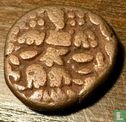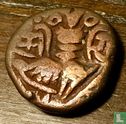

Enlarge image


Catalogue information
LastDodo number
7530963
Area
Coins
Title
Kashmir AE16 958-1003
Country
Face value
Year
958
Variety / overstrike
Head of State
Type
Designer
Series
Theme
Material
Weight
5.3
Diameter
16
Thickness
Punch
Shape
Obverse
Reverse
Edge
Plain
Privy mark
Mint mark
Number produced
Krause and Mishler number
Catalogue number
Details
Obv: seated queen
Rev; dancing goddess
Didda Rani (or Didarani) was one of the very few female monarchs in Indian history.
Didda was a daughter of Simharāja, the king of Lohara, and a granddaughter on her maternal side of Bhima Shahi, one of the Hindu Shahi of Kabul. Lohara lay in the Pir Panjal range of mountains, on a trade route between western Punjab and Kashmir.
She married the king of Kashmir, Ksemagupta, thus uniting the kingdom of Lohara with that of her husband. Even prior to becoming Regent Didda had considerable influence in state affairs, and coins have been found which appear to show both her name and that of Ksemagupta.
When Ksemagupta died following a fever contracted after a hunt in 958, he was succeeded by his son, Abhimanyu II. As Abhimanyu was still a child, Didda acted as Regent and effectively exercised sole power. Compared to other societies of the period, women in Kashmir were held in high regard.
Her first task was to rid herself of troublesome ministers and nobles, whom she drove from office only to have them rebel against her. The situation was tense and she came close to losing control, but having asserted her position with support from others, including some whom she bribed, Didda displayed a ruthlessness in executing not only the rebels who had been captured but also their families. Further trouble erupted in 972 when Abhimanyu died. He was succeeded by his son, Nandigupta, still a young child himself, and this caused restlessness among the Dāmaras, who were feudatory landlords and later to cause huge problems for the Lohara dynasty which Didda founded.
In 973 she "disposed of" Nandigupta, in Stein's phrase, and then did the same to Tribhuvanagupta, his younger brother, in 975. This left her youngest grandson, Bhimagupta, on the throne, again with Didda as Regent. Her desire for absolute power became untrammeled, especially after the death of Phalunga, a counsellor who had been prime minister of her husband before being exiled by Didda after Ksemagupta's death and then brought back into her fold when his skills were required. She also took a lover called Tunga at this time, and although he was a mere herdsman, this provided her with a sense of security sufficient that in 980 she arranged for Bhimagupta to be tortured to death and assumed unfettered control for herself, with Tunga as her prime minister.



